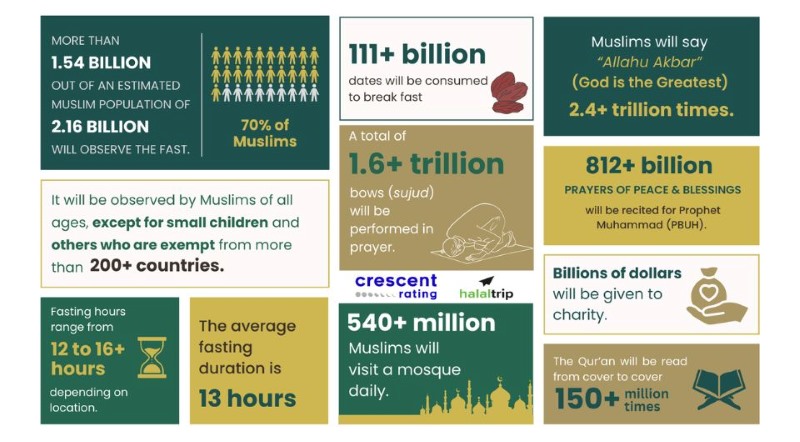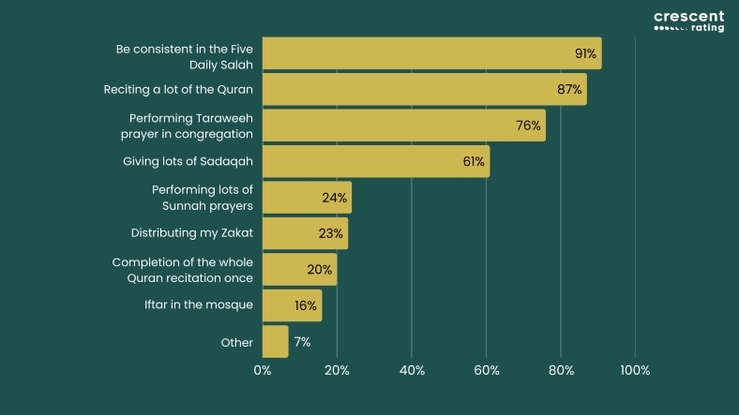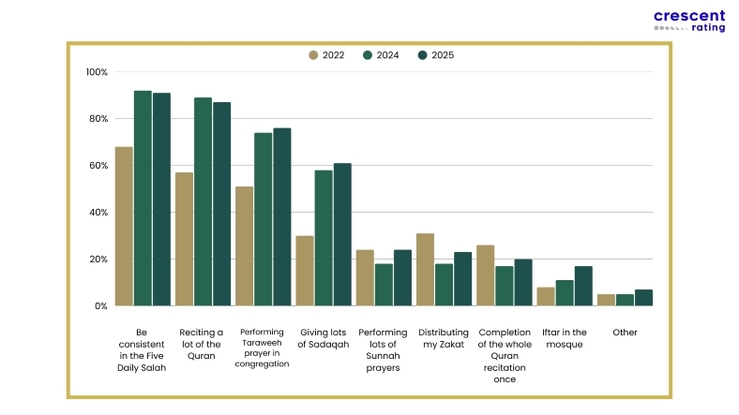
This year, CrescentRating surveyed to understand the spiritual commitment of Muslims during the month of Ramadan, comparing numbers from 2022 and 2024. The primary objective of this survey was to capture the main spiritual activities that Muslims anticipate during the holy month. The selected activities for the survey included a range of religious practices, from the consistency in performing the Five Daily Salah to the distribution of Zakat and the completion of the Quran recitation. Respondents were asked to rank the top three spiritual activities they looked forward to during Ramadan, providing information into the Muslim community's religious priorities and personal commitments.


The survey data reflects Ramadan practices across the three years. As noted in 2024, the top three priorities have been consistent over the years. The primary highlights are:
1. Commitment to Daily Salah: The percentage of respondents prioritizing consistency in the five daily prayers remains the majority at 91% in 2025. Focusing on daily prayers remains the top priority, reflecting that Muslims make a firm resolve to perform their 5 times a day.
2. Constant Engagement with the Quran: The survey shows that 87% of Muslims look forward to reciting the Quran during Ramadan in 2025. This is close to the percentages in 2024 (89%), but it remains a significant increase compared to 57% in 2022. This highlights the continued deepening of spiritual connection and the Quran's central role during Ramadan.
3. Increased Participation in Taraweeh Congregations: This year, 76% of respondents aim to join Taraweh prayers in the congregation during Ramadan, continuing its upward trend from 74% in 2024 to 51% in 2022. Muslims tend to emphasize Taraweeh's social and spiritual significance and commitment to communal worship during Ramadan.
4. Growing Emphasis on Giving Sadaqah: The importance of giving Sadaqah continued to rise to 61% in 2025, up from 58% in 2024, reflecting a heightened sense of social conscience as more Muslims recognize the impact of charitable giving and support those in need.
5. Renewed Interest in Sunnah Prayers: Following the 2024 decline to 18%, interest in performing Sunnah Prayers returned to 24% in 2025, matching the 2022 level. This resurgence suggests a rekindled dedication to voluntary acts of worship, possibly influenced by a greater emphasis on personal spirituality and increased awareness.
6. Shifts in Zakat Distribution: The survey reveals a slight rebound in the emphasis on Zakat distribution, rising to 23% in 2025 after dropping to 18% last year. This shift may indicate improved accessibility and convenience in fulfilling Zakat obligations, with more digital platforms and streamlined processes making it easier for Muslims to contribute effectively.
7. Continued Efforts to Quran Recitation: The percentage of Muslims aiming to complete the Quran at least once during Ramadan recovered slightly to 23% in 2025 after dropping to 18% in 2024. Despite increasingly busy schedules, individuals are finding ways to incorporate Quran recitation into their daily routines and dedicating time for spiritual growth.
8. Increased Attendance at Mosque Iftars: More Muslims are choosing to break their fast this year in a mosque setting, with participation rising to 17% in 2025, compared to 11% in 2024, indicating a stronger sense of communal and spiritual experience of sharing Iftar.
Renewed Focus on Foundational Acts of Worship
Despite slight variations, devotion to core religious practices remains central. Many continue prioritizing the Five Daily Salah and Quran recitation, reinforcing commitment to spiritual growth. Even amid busy schedules, this consistency reflects their significance in a Muslim’s life, making them fundamental rituals, particularly during the holy month.
Strengthening Communal Worship and Engagement
Ramadan fosters a sense of bonding, with families and communities coming together for congregational prayers, especially for special Ramadan prayers like Taraweeh and Iftar at mosques. These shared experiences allow individuals to reconnect through worship, strengthening spiritual and familial ties. Muslims deepen their faith by engaging in collective religious practices while nurturing a sense of togetherness within their communities.
Positive Shift in Charitable Giving
Charitable contributions are evolving, with a noticeable increase in voluntary donations alongside the compulsory Zakat; many also prioritize acts of Sadaqah to support community needs. The ease of digital payment platforms has made fulfilling charitable duties more convenient. This growing focus highlights generosity and social responsibility as a key aspect of Ramadan observance.
Resurgence in Sunnah and Voluntary Worship
Many Muslims dedicate more time to performing Sunnah prayers and completing the Quran to enhance their spiritual experience during this holy month. As they reflect on life’s challenges, there is a renewed desire to find solace and strength in worship. Ramadan serves as an opportunity for individuals to reconnect with their faith and seek peace.
Integrating Ramadan into Modern Lifestyle
Religious observance is increasingly integrated into Muslims' busy schedules, with many finding new ways to maintain their spiritual commitments. Accessible tools, flexible prayer arrangements, and structured worship plans have made balancing faith and daily responsibilities more manageable, helping individuals stay in check during Ramadan. This ensures that faith remains a priority, allowing individuals to uphold their spiritual practices despite the demands of modern life.
The 2025 Ramadan trends reflect a deepening spiritual commitment, stronger community bonds, and an evolving approach to religious observance. Core acts of worship, such as daily Salah and Quran recitation, remain central to modern-day activities. At the same time, increased participation in congregational prayers and Iftar at the mosque underscores a renewed sense of unity. Charitable giving has also expanded, emphasizing voluntary Sadaqah alongside compulsory Zakat. This year, these patterns indicate a holistic approach to Ramadan, where devotion and communal engagement are seamlessly integrated. As Muslims continue to adapt these spiritual practices to their daily life, the essence of Ramadan inspires reflection, generosity, and spiritual growth, holding significance in a Muslim’s year.